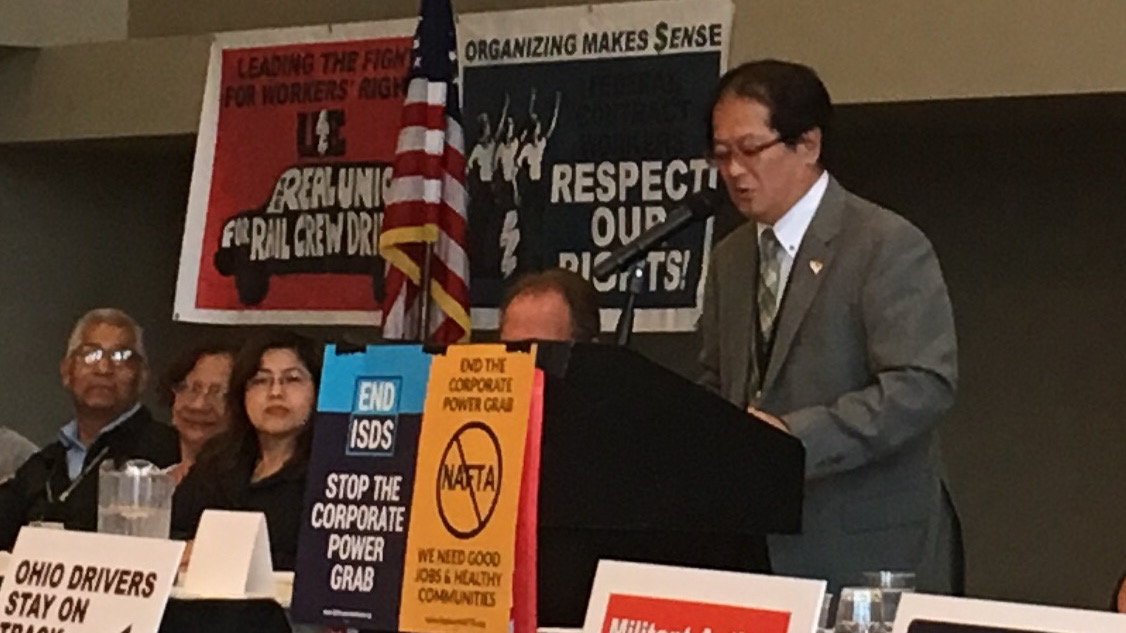UE’s 75th national convention this year brought opportunities for strengthening our international partnerships. Eleven representatives from five unions from four countries joined us, five of whom addressed the convention.
Unifor National President Jerry Dias spoke of the shared history between UE and Unifor. UE was the first US-based union to recognize the autonomy of its Canadian locals, and in 1992, UE Canada joined the Canadian Autoworkers (CAW), one of Unifor’s predecessor unions. And he also spoke about the importance of the North American Solidarity Project being launched by UE and Unifor, to change and renew the labor movement in both countries.
He explained how Unifor’s predecessor unions, faced with an extreme right-wing government in 2011, launched the “New Union Project” to create a new national Canadian union with a new identity, structure and operating principles that could change the labor movement and the country.
He outlined several principles for this new kind of solidarity: rank-and-file democracy; a determination to go on the offensive for worker rights and to organize, speak and act on behalf of the whole working class, organized and unorganized; a comprehensive commitment to equity and a relentless struggle against racism, sexism, homophobia and other discriminations that divide us; bargaining for progress, not concessions or two tier; and last but not least, an all-in commitment to labour politics that breaks the pattern of contracting out our politics to politicians and parties that neglect, minimize or compromise worker rights.
Dias spoke about the legacy of the North American Free Trade Agreement (NAFTA), which has devastated manufacturing jobs in the US and Canada, and has been a disaster for workers in all three countries. He is the only trade unionist who is part of the NAFTA renegotiations currently taking place, and he spoke about how “a better NAFTA” has to be about creating jobs in the US and Canada, not destroying them. “My problem isn’t with Mexican workers,” he pointed out. “It is with the corporations that exploit workers in all three countries.”
He talked about how, after a century of production in Peterborough, Ontario, General Electric announced last week that they were closing the plant, at the cost of 360 jobs, members of Unifor Locals 599 and 524. He thanked UE and Local 506 for their immediate offer of solidarity, and said that while GE often cites “global pressure” as a reason to close plants or destroy jobs, that workers united across borders could put real “global pressure” on GE.
Dias concluded by observing that “an attack on one is an attack on all, and we will all stand strong when we stand against racism and with women, immigrants and refugees and our LGBTQ+ community,” and that “the most important way for us to build a just society is through our collective voice in the labor movement.”
Watch video of President Dias’s speech here
Dominique Daigneault, president of the Montreal Central Council of CSN, spoke about how the CSN and UE first met in Mexico at a political education training with the FAT. Daigneault described the militant resistance of the Quebec labor and social movements to their provincial government’s attempts to impose austerity measures, cutting social spending.
“We occupied the banks and financial businesses – this is where the money is, in the pockets of the rich companies.” She concluded with an appreciation of UE delegates: “The world needs more union activists and troublemakers like you.”
Daniele Calosi, FIOM’s National Representative responsible for General Electric, spoke about the global crisis of capitalism which is destroying the industrial base in North America and Europe and rolling back workers’ rights. The political system has not been able to reverse this phenomenon, and even parties based in the workers’ struggle have been unable to propose an alternative to globalization.
The attack on workers’ rights is accompanied by an attack on human rights, in the form of rising racist and fascist movements, in both Europe and North America. Unions need to fight this with a strong international solidarity to fight not only for better working conditions, but for better living conditions and sustainable development. This is the reason why FIOM and UE are working together to convene a meeting to establish an international network of GE workers.
Masamichi Watanabe, Deputy Secretary General of Zenroren, described Zenroren’s two major campaigns for the coming year: preventing militaristic revisions of Japan’s constitution, and winning provisions for “decent work.” Japan’s constitution, adopted after World War II, commits the nation to peace — but the current prime minister has announced his intention to revise it to allow the revival of a “war state.” Zenroren is expanding a new coalition of labor unions, citizens, and opposition parties to oppose the prime minister’s military bravado.
Zenroren is also struggling against attempts by the government to deregulate labor protections and undermine collective bargaining. Agreements between the government, employers and company unions are not only insufficient to prevent “Karoshi,” or death from overwork, but may actually increase it. Zenroren is organizing workers to join their struggle to instead win protections for “decent work” and an increase in the minimum wage.
Benedicto Martínez, one of the FAT’s National Coordinators and a long-time friend of the UE, spoke of the long and deep relationship between the two unions. In October the FAT will be celebrating their 57th anniversary. “Of the 57 years we have been going, 25 have been with the UE,” he said proudly.
Martínez spoke about effect of NAFTA on Mexico, as people from rural areas leave the land, some of them so desperate that they risk crossing the border into the U.S. to look for work. Violence has been increasing in Mexico, fueled by the so-called “war against drugs.”
“We are mobilizing against the renegotiation of NAFTA, because we don’t want another agreement that will leave us even poorer.” He noted that the Mexican government is trying to renegotiate NAFTA quickly, because they don’t want the negotiations to still be going when they face elections, next year.

